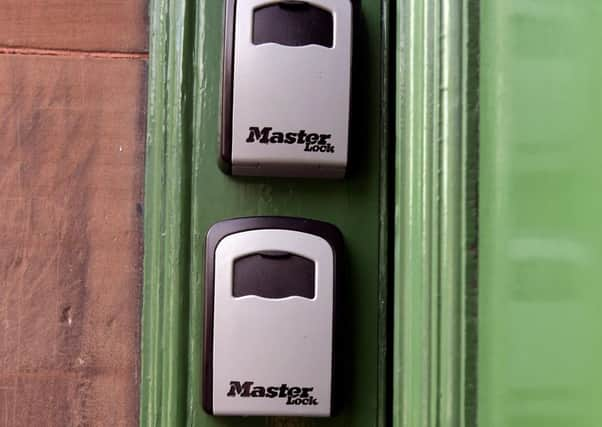Short-term let owners in Edinburgh ‘subsidised by £2.6 million’


Figures published by Airbnb suggest that hosts in the city made £78m from letting out their properties last year, but many are paying nothing for basic services such as bin collections and pavement repairs from which they and their tenants benefit.
More than 1,000 property owners – the majority of those who declare their short-term lets to tax officials as a business – are paying nothing for local services, with the bill being picked up by Scottish taxpayers.
Advertisement
Hide AdAdvertisement
Hide AdThat is a result of small business rates relief – a concession designed to support small, independent traders – being applied under current regulations to short-term let properties.
Tax being lost to the public purse may be higher due to the sector being left to largely regulate itself.
If every Airbnb host renting out their entire property in Edinburgh qualified through the loophole, to take an extreme example, the potential liability to taxpayers for reimbursed business rates would be more than £14 milion.
One landlord branded the loophole “a bad joke” and called on the Scottish Government to take action.
The proliferation of short-term lets in the city means some residents say they feel like they are “sponsoring” businesses run by people who do not contribute to the local authority’s coffers.
In the first of a three part in-depth Evening News investigation into the impact of the short-term let industry on Edinburgh beginning today, we can reveal:
• There are more than 11,000 active listings (listings with at least one review in the last year) on Airbnb in the Capital.
• More than 7,000 of these are entire properties, with another 4,000 rooms inside houses and flats.
Advertisement
Hide AdAdvertisement
Hide Ad• Only 1,700 properties are listed as short-term self-catering units on the business rates register.
• Nearly 40 per cent of active Airbnb listings in Edinburgh are run by ‘multi-listers’.
• Income from Airbnbs could rake in more than £1.2m per night if all listings were booked.
Under current Scottish Government rules, any short-term let which operates for more than 140 days a year does not have to pay council tax and instead becomes liable for business rates.
However, because small businesses with a rateable value of £15,000 or under are given total relief from business rates, it means most short-term lets in the city that declare themselves as businesses pay no tax to the council.
The money lost by the council from the business rates exemption is repaid to the council by the Scottish Government, which means Scottish taxpayers footing the bill.
• READ MORE: ‘Party flat’ ban for Edinburgh Airbnb property owner
Airbnb claimed hosts in Edinburgh made £78 million in 2018 from letting out their properties.
Advertisement
Hide AdAdvertisement
Hide AdOne landlord, who manages a portfolio of 100 properties, mostly in Edinburgh, called the loophole a “bad joke”.
The businessman, who wished to remain anonymous, said: “On the one hand the authorities say they want to clamp down on unregulated short-term lets, because that remove stock from the housing market, causing shortages for families or long-term renters.
“There’s also a major issue with anti-social behaviour, with locals councils powerless to take any action when it happens in Airbnb properties.
“Yet on the other hand the system is handing a conveyer belt of breaks and incentives to Airbnb operators. The council tax exemption is just one of the most shocking breaks. I know someone who just got £2,500 in backdated council tax refunds for their Airbnb property.” It’s a bad joke.”
An Airbnb spokesman said: “This data is pure speculation and doesn’t reflect the reality of hosting in Edinburgh.
“The truth is that local hosts share their homes for an average of less than four nights a month – well below 140 nights a year – and guests on Airbnb account for less that 3 per cent of visitors to Scotland.” We remind all hosts to follow the rules, pay VAT on every transaction and support plans for a tourist tax in Scotland. We also support clear home sharing rules in Scotland and continue to work with the government.”
Councillor Kate Campbell, housing and economy convener at City of Edinburgh Council, said the tax system should not incentivise turning properties into short-term lets.
She said: “What is most important is that our tax system must not incentivise landlords to turn properties into short term lets rather than keep them as permanent homes. The question of the small business bonus scheme has to be looked at in this context.
Advertisement
Hide AdAdvertisement
Hide Ad“It’s good that the Scottish Government consultation has asked about this, and it’s right that they take time to look at the question of taxation so that we end up with a system where short term let landlords do pay for the public services that they are using.”
Housing Minister Kevin Stewart said the government is now considering its response to its recent consultation on the issue of short term lets.
He said:“We are committed to working with local authorities to give them the powers they need to balance the unique needs of their communities with wider economic and tourism interests.
“While short-term lets can have a positive impact and help boost the tourism economy across all areas of Scotland, we know that they can also create challenges. That’s why we want to ensure that short-term lets are regulated appropriately.
“We do not recognise the figures stated. The Scottish Government is dedicated to delivering a rates regime that is fair and sustainable. This is why we prioritise small businesses by providing a Small Business Bonus Scheme which is universally available.”